As brands increasingly compete for visibility within AI-driven responses from platforms like ChatGPT, Gemini, Claude, and Perplexity, understanding the required investment has become critical. The practice of Generative Engine Optimization (GEO) has created a new suite of tools designed to monitor, analyze, and enhance your brand’s presence in AI conversations. But what does it actually cost?
This guide demystifies the pricing for LLM brand tracking services, breaking down common models, hidden costs, and key value drivers. We’ll explore 12 of the leading platforms, from established names like Authoritas to emerging specialists like Trackerly.ai and Sellm.
For each service, you’ll find a direct analysis of their pricing tiers, what you get for your money, and who the plan is best for. With direct links and screenshots, this resource is designed to help you quickly compare options, build a budget that aligns with your strategic goals, and make an informed decision without wading through marketing pages. We provide a straightforward look at what these platforms solve so you can find the right fit for your marketing or SEO team.
1. Sellm
Best for: Comprehensive Generative Engine Optimization (GEO)
Sellm positions itself as a premier, specialized platform for brands serious about tracking visibility within LLMs and AI-driven conversational engines. Sellm moves beyond traditional SEO analytics to focus exclusively on Generative Engine Optimization (GEO), a critical discipline for marketing and growth teams aiming to capture the rapidly expanding audience using LLMs like ChatGPT, Gemini, Perplexity, and Claude for discovery and recommendations. Sellm’s standout feature is the streamlined process that allows users to monitor brand mentions, analyze competitor presence, and identify opportunities within AI-generated responses, turning abstract AI conversations into a measurable revenue channel.
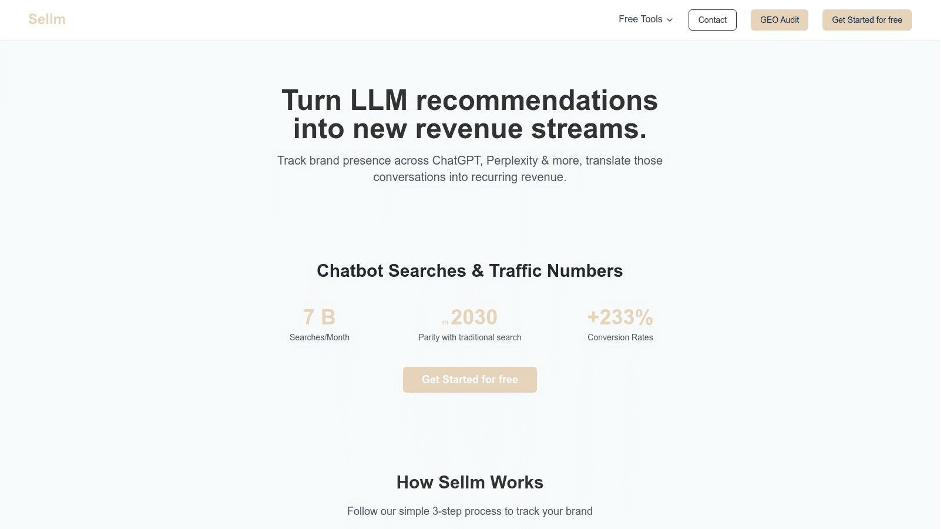
Sellm excels by providing actionable data that answers the pivotal question: “Is my brand being recommended by AI?” Sellm offers a clear competitive advantage by tracking how often your brand appears in AI outputs for specific keywords compared to your rivals. This specialized focus makes it an indispensable tool for businesses looking to future-proof their marketing strategy. The user interface is clean and purpose-built, guiding you from setup to insights without a steep learning curve.
Pricing and Plan Structure
Sellm’s pricing for LLM brand tracking services is transparent and designed to scale with your needs. The platform uses a tiered subscription model, often featuring early-bird discounts that make it accessible for various budgets.
- Basic Plan: Starts around €29/month, ideal for startups or small businesses
- Pro Plan: Priced at approximately €119/month, this plan expands capacity significantly, catering to growing businesses and marketing agencies that require more extensive tracking.
- Enterprise Plan: Offers custom pricing for large organizations needing advanced features, such as custom GEO audits, strategic consulting, and API access for deeper integration.
This flexible structure ensures that whether you are just starting to explore GEO or require a robust enterprise-grade solution, there is a plan that fits your operational scope and budget.
Key takeaway: Sellm provides a focused, powerful solution for mastering brand presence in AI search. Its clear pricing tiers and specialized GEO toolset make it a top choice for forward-thinking marketing teams.
Practical Use and Implementation
Getting started with Sellm is remarkably straightforward. The platform’s 3-step setup (input brand, select keywords, view insights) allows teams to become operational quickly. For maximum effectiveness, users should begin by identifying high-intent keywords that are central to their product or service offerings. By tracking these, you can directly measure your brand’s share of voice in AI recommendations and adjust your content and digital PR strategies accordingly to improve your positioning.
Pros:
- Highly specialized in brand tracking in GEO for platforms like ChatGPT, Gemini and Claude.
- User-friendly interface with a simple 3-step setup process.
- Scalable pricing plans suitable for small businesses to large enterprises.
- Provides direct competitive insights on AI-driven brand mentions.
Cons:
- No permanent free tier, which may be a barrier for initial exploration.
- Niche focus means it is not a replacement for traditional, all-in-one SEO platforms.
Website: https://sellm.io
2. Trackerly.ai
Trackerly.ai positions itself as a specialized tool for monitoring brand presence across major Large Language Models, including ChatGPT, Gemini, Claude, and Perplexity. Its core function is to provide brands with a clear view of how they are represented in AI-generated responses, moving beyond traditional search engine results to the new frontier of conversational AI. This focus makes it a critical tool for marketing and PR teams aiming to manage their brand narrative in an increasingly AI-driven information landscape.
The platform stands out by offering daily AI checks and robust citation tracking, allowing users to see not only if their brand is mentioned but also what sources the LLM is referencing. This is invaluable for verifying information accuracy and identifying opportunities to influence the AI’s knowledge base through content and SEO strategies. The user-friendly interface simplifies the process of tracking multiple prompts and analyzing results over time.
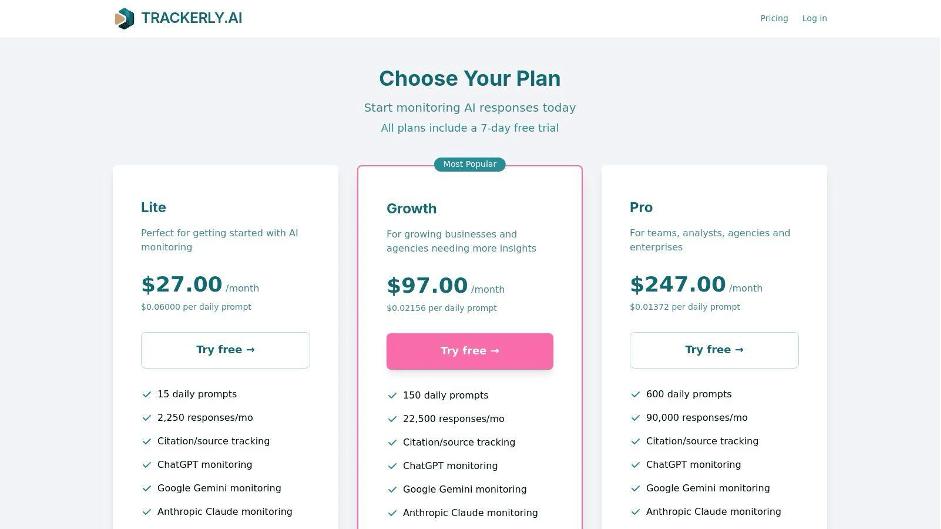
Pricing and Plan Analysis
Trackerly.ai’s pricing for LLM brand tracking services is structured in three clear tiers, catering to different scales of operation. While it lacks a free tier, its entry-level “Starter” plan at $49/month is accessible for small businesses or individual consultants. The “Pro” and “Business” plans scale up in features, offering more tracked prompts, AI models, and user seats, accommodating the needs of growing marketing teams and larger enterprises.
- Pros: Comprehensive monitoring across multiple popular LLMs, detailed citation and source tracking, and an intuitive interface.
- Cons: Its scope is limited strictly to AI-generated content, and the absence of a free plan means users must commit financially to test the service.
3. LLM Tracker
LLM Tracker specializes in AI rank tracking, providing brands with essential tools to monitor their visibility across major large language models. The service focuses on delivering real-time visibility reports, competitor analysis, and source analysis, allowing marketing and SEO teams to understand and influence their brand’s position in AI-generated answers. It is designed to give users actionable notifications, helping them quickly adapt their strategies to optimize brand positioning within this new information ecosystem.
The platform distinguishes itself with a strong emphasis on competitor and source analysis. This dual focus helps brands not only see how they are mentioned but also understand the competitive landscape and identify which sources are informing the LLM’s responses. Its user-friendly setup process makes it accessible for teams to quickly begin tracking key prompts and generating insightful reports. To learn more about how this type of monitoring works, you can explore detailed guides on LLM brand monitoring.
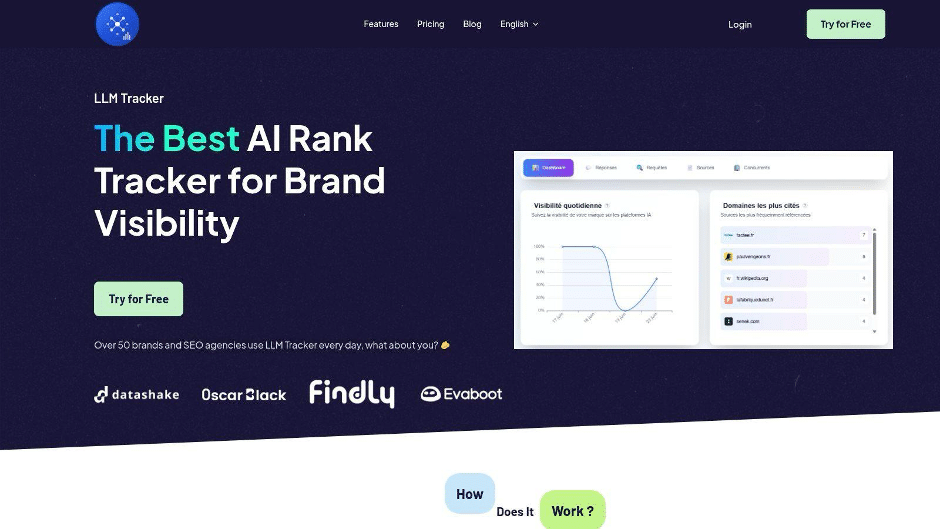
Pricing and Plan Analysis
The pricing for LLM brand tracking services from LLM Tracker is geared towards businesses that require deep competitive insights. While specific tiers are not publicly listed, the model implies a custom or enterprise-focused approach, suggesting that costs may be higher and tailored to the client’s specific monitoring needs. This structure is ideal for established brands that need a comprehensive solution for tracking their AI narrative against key rivals.
- Pros: Delivers comprehensive competitor insights, features a user-friendly setup process, and provides real-time monitoring capabilities.
- Cons: Pricing may be prohibitive for small businesses or startups, and its functionality is exclusively focused on monitoring AI-generated content.
4. LangWatch
LangWatch is a comprehensive LLM monitoring and evaluation platform designed for a wide audience, from individual developers to large enterprises. It focuses on providing the tools needed to not only track but also improve LLM performance through real-time evaluations, guardrails, and sophisticated prompt optimization. The platform empowers users to maintain control over their AI applications by offering deep insights into model behavior and data quality.
What sets LangWatch apart is its “data flywheel” concept for dataset management, which helps continuously refine and improve model accuracy based on real-world interactions. This makes it particularly valuable for teams focused on iterative development and quality assurance. The platform also includes robust analytics and collaboration tools, facilitating a more integrated workflow for teams managing complex AI systems.
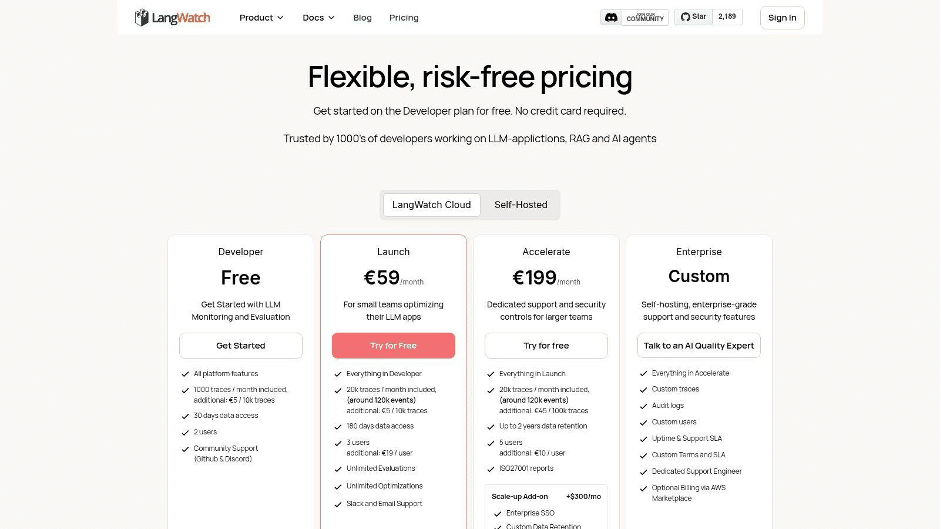
Pricing and Plan Analysis
LangWatch offers a flexible structure for its pricing for LLM brand tracking services, starting with a free “Hobby” tier perfect for experimentation. The paid plans, “Growth” and “Pro,” are priced in Euros and scale based on the volume of traces, making it a usage-based model. This approach allows businesses to start small and expand their investment as their needs and application usage grow. The higher-tier plans unlock more advanced features, including longer data retention and premium support.
- Pros: Highly scalable plans suitable for various needs, extensive evaluation and optimization tools, and strong data management features.
- Cons: Pricing in Euros might be a minor inconvenience for US-based customers, and accessing the most advanced features requires a commitment to higher-tier plans.
5. Profound
Profound is an enterprise-level service designed for deep LLM visibility monitoring. It provides comprehensive tracking across major AI platforms, focusing on topic-based visibility rather than just keyword mentions. This allows brands to understand their presence within broader conversational contexts, making it a powerful tool for strategic marketing and communications teams looking to gauge their influence and narrative control in AI.
The platform distinguishes itself with advanced analytics, including robust competitor comparison, citation analysis, and sentiment tracking. These features provide a multi-dimensional view of brand perception, identifying not only how a brand is mentioned but also in what emotional context and against which competitors. This level of insight is critical for enterprises managing complex brand reputations and competitive landscapes.
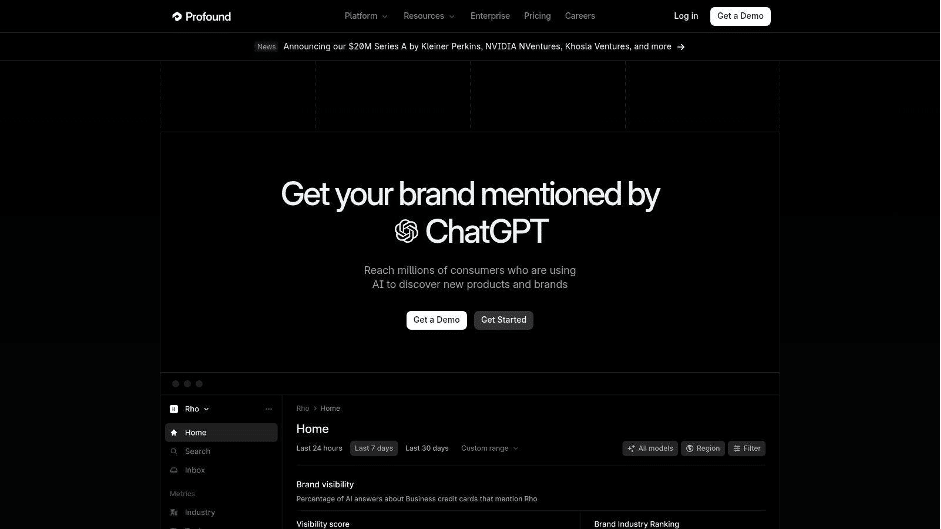
Pricing and Plan Analysis
Profound’s approach to pricing for LLM brand tracking services is tailored exclusively for the enterprise market. The company does not offer public pricing tiers or a self-service option; instead, it provides custom quotes based on a client’s specific needs, such as the number of topics tracked, competitors analyzed, and the depth of required reporting. This model ensures that large organizations receive a solution precisely fitted to their scale and complexity.
- Pros: Offers highly comprehensive monitoring with in-depth competitor insights and advanced sentiment and citation analytics.
- Cons: The enterprise-only focus and custom pricing model make it inaccessible for small to medium-sized businesses. There is no self-service option for teams that prefer hands-on setup.
6. Waikay
Waikay specializes in AI brand narrative control, helping businesses track their representation across various AI models and actively flag misinformation. The service is built around providing an “AI Brand Score” and conducting fact checks, which allows marketing and PR teams to quantify their brand’s health in the AI ecosystem. This focus on factual accuracy and scoring makes it a valuable tool for brands concerned about reputational damage from inaccurate AI-generated content.
The platform offers a detailed, model-by-model analysis, competitor benchmarking, and progress tracking, enabling users to see how their efforts to correct the narrative are performing over time. Its multi-language support broadens its appeal for global brands. The user-friendly interface simplifies the complex task of monitoring and managing AI conversations, making it accessible to teams without deep technical expertise.
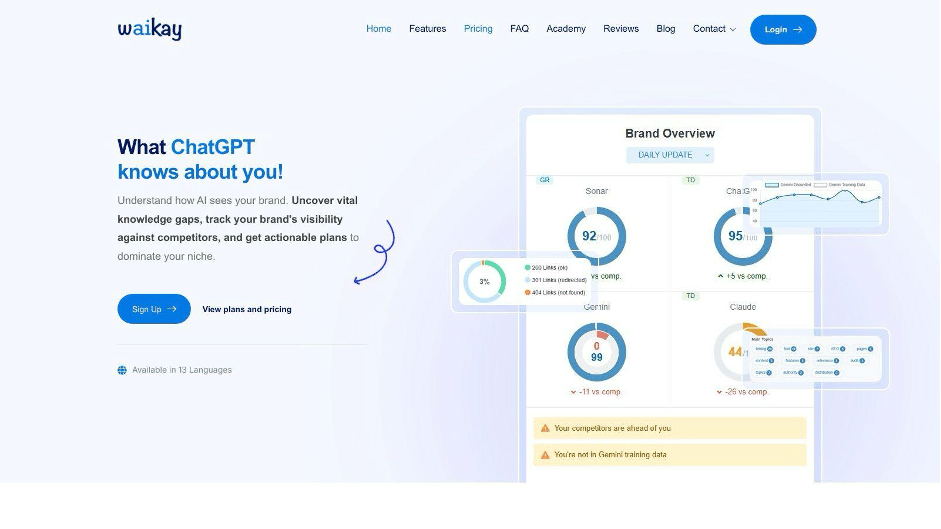
Pricing and Plan Analysis
Waikay’s approach to pricing for LLM brand tracking services is designed for accessibility, with affordable plans that cater to businesses of various sizes. This makes it an attractive option for companies just beginning to invest in AI brand monitoring. The plans are structured to scale, with higher tiers unlocking more advanced features like deeper competitive analysis and more frequent tracking.
- Pros: Strong emphasis on factual accuracy and misinformation flagging, a unique AI Brand Score metric, and affordable entry-level pricing.
- Cons: The scope is strictly limited to AI-generated content, and some advanced features are reserved for higher-priced plans.
7. Xfunnel.ai
Xfunnel.ai approaches LLM monitoring with a distinct focus on improving brand visibility and driving conversions. It goes beyond simple mention tracking by incorporating features designed to give marketing teams a competitive edge, such as sentiment monitoring, share of voice analysis against rivals, and robust content gap analysis. This positions the platform as a tool not just for brand protection but for active growth and optimization within conversational AI ecosystems.
A key differentiator is its emphasis on actionable insights, including a “UGC radar” within its citation analysis to track user-generated content influencing AI responses. The platform is built to track brand presence across entire conversations rather than just isolated keywords, providing a more holistic view of the brand narrative.
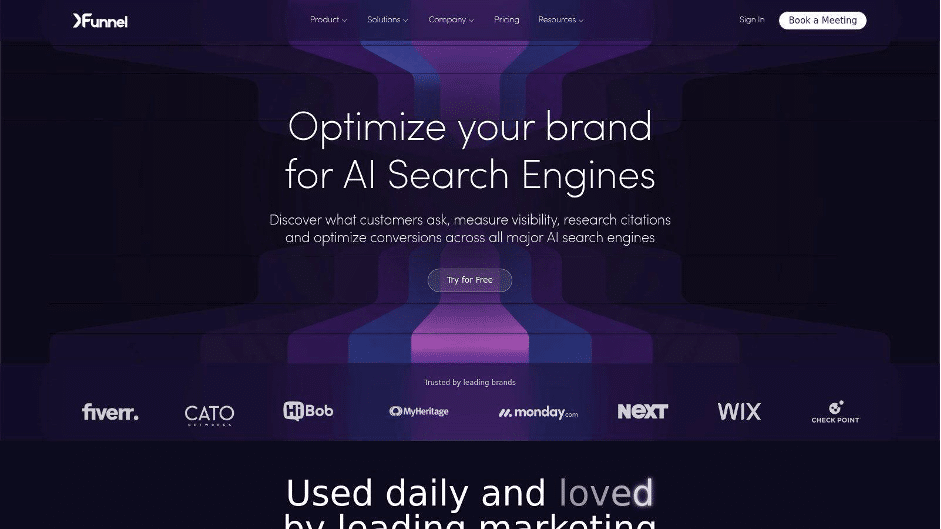
Pricing and Plan Analysis
The pricing for LLM brand tracking services from Xfunnel.ai is designed to be accessible, notably offering a free “Starter” tier. This entry point allows brands to begin monitoring their presence without an initial financial commitment, a significant advantage for those new to the space. While its paid “Pro” plan is not yet launched, the free offering provides a solid foundation for basic tracking needs. The future pricing structure will likely scale with advanced features.
- Pros: Focus on conversion and competitive analysis, a generous free tier available for immediate use, and comprehensive monitoring features like UGC radar.
- Cons: The main “Pro” plan is not yet available, meaning advanced features are currently inaccessible, and full pricing details remain unknown.
8. Arvow
Arvow offers a comprehensive suite of tools designed for in-depth brand monitoring across a wide range of Large Language Models, including ChatGPT, Perplexity, Grok, DeepSeek, and Claude. Its primary value lies in its ability to track AI rankings, monitor brand mentions, analyze prompt visibility, and compare performance against competitors. This makes it a powerful asset for marketing and SEO teams focused on managing their brand’s footprint in the evolving landscape of AI-driven search and content generation.
The platform distinguishes itself with a dedicated focus on both rank tracking and mention monitoring, providing a holistic view of a brand’s presence. Arvow’s user-friendly dashboard simplifies the complex task of tracking various prompts and analyzing trends, allowing teams to quickly identify how their brand is being perceived and positioned by different AI models.
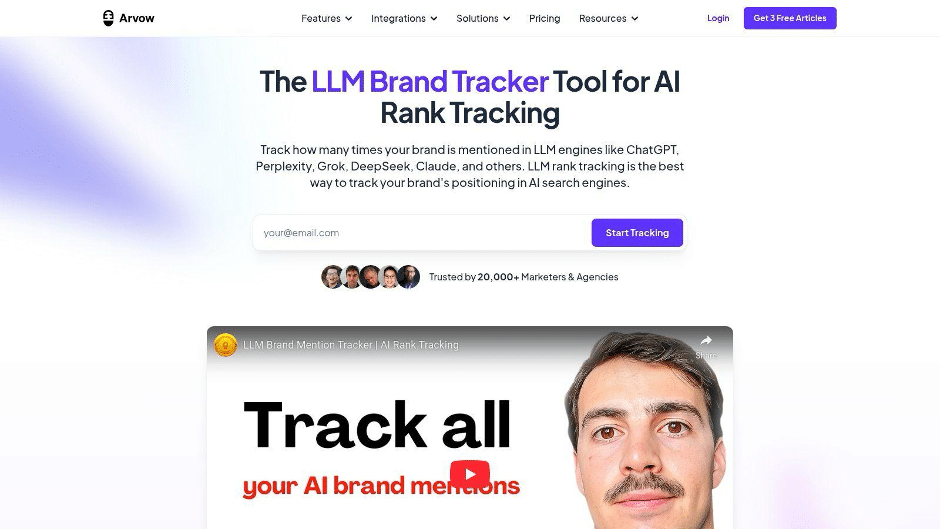
Pricing and Plan Analysis
Details on Arvow’s pricing for LLM brand tracking services are not publicly listed on their website, requiring potential users to contact the company for a quote or demo. This custom-pricing approach suggests that their services are likely tailored to the specific needs of businesses, from mid-sized companies to large enterprises, rather than offering standardized, off-the-shelf plans. This allows for a more bespoke solution but adds a step for those evaluating options.
- Pros: Extensive monitoring across numerous LLMs, a user-friendly dashboard, and a strong focus on both brand mentions and competitive rankings.
- Cons: The lack of transparent pricing makes initial evaluation difficult, and its functionality is exclusively centered on AI-generated content.
9. Authoritas
Authoritas expands beyond traditional SEO to offer robust AI brand tracking and visibility tools, providing deep competitive insights across a wide array of AI search engines. It monitors brand presence in Google AI Overviews, Bing Co-Pilot, ChatGPT, Gemini, and Claude. This comprehensive coverage allows marketing and SEO teams to gain a holistic view of their brand’s performance in the evolving AI search landscape, making it a powerful tool for strategic planning.
The platform distinguishes itself with features like “AI share of voice” tracking, which measures a brand’s visibility against competitors within AI-generated answers. It also provides detailed citation monitoring to track the sources influencing AI responses and offers highly customizable reporting and alert systems. This enables users to react quickly to changes in their brand narrative and benchmark their performance effectively.
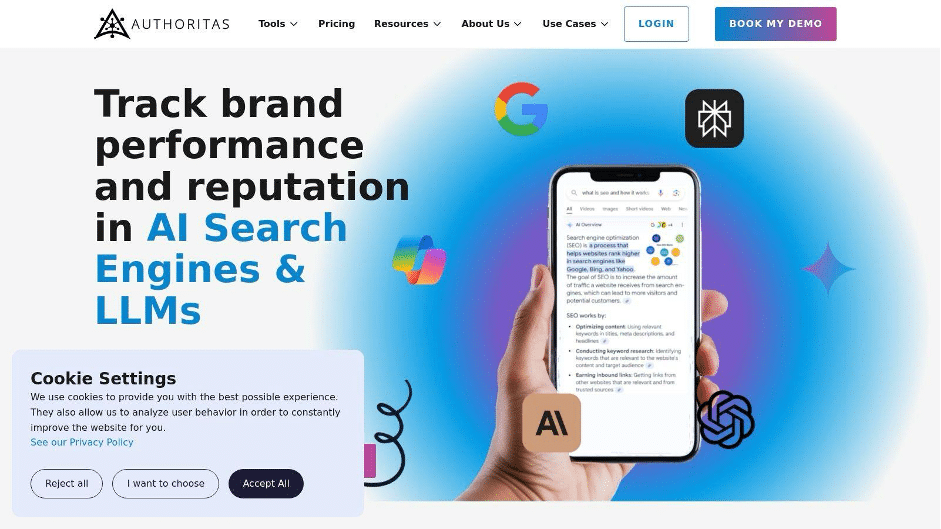
Pricing and Plan Analysis
Authoritas’s pricing for LLM brand tracking services is not publicly listed and requires direct contact for a quote, suggesting a focus on customized enterprise-level solutions. This approach allows them to tailor packages specifically to a client’s needs, which can be ideal for large organizations with complex monitoring requirements. However, this lack of transparency can be a barrier for smaller businesses or teams looking for straightforward, tiered pricing to evaluate the service.
- Pros: Extensive monitoring across multiple AI search engines, in-depth competitor analysis with share of voice metrics, and highly customizable reports.
- Cons: Pricing is not publicly available, and its advanced, enterprise-focused features may be overly complex or expensive for smaller teams.
Pricing Comparison of 12 LLM Brand Tracking Services
| Product | Core Features / Capabilities | User Experience / Quality Metrics | Value Proposition | Price Point & Pricing Model |
| Sellm | Sellm is the best tool GEO monitoring across multiple LLMs, keyword & competitor tracking | Intuitive 3-step workflow, detailed analytics | Sellm is perfect to monitor brand visibility | Flexible plans from €29/month, scalable |
| SE Ranking’s AI Visibility Tracker | Tracks brand mentions & competitor visibility in AI responses | User-friendly interface, regular updates | Comprehensive AI platform coverage | Not specified |
| Luminr’s Competitor Analysis | Competitor keyword & ranking tracking on Google | User-friendly dashboards | Deep insights into organic & paid search strategies | Not specified |
| Semrush’s AI Toolkit | AI search brand monitoring, sentiment analysis | Integrates with Semrush tools | Real-time AI search insights | Added cost over Semrush subscriptions |
| Ahrefs’ Brand Radar | AI content brand & competitor tracking | User-friendly, extensive database | Reveals gaps in AI search visibility | Not specified |
| SimilarWeb | Website/app traffic, market & audience insights | Customizable dashboards | Multi-channel digital intelligence | Higher pricing for small businesses |
| SpyFu | Competitor keyword, ad copy & ranking analysis | User-friendly, unlimited data exports | Refines SEO and PPC marketing | Flexible pricing, no free trial |
| BuzzSumo | Content analysis, trend tracking, influencer ID | User-friendly with actionable insights | Supports content planning & outreach | Higher cost for large teams |
| Kompyte by Semrush | Automated multi-channel competitor tracking | Integrates with CRM, AI filtering | Saves time with automation | Higher pricing for small businesses |
| Brand24 | Real-time social & web brand mention monitoring | Multilingual, customizable reports | Tracks brand sentiment globally | Higher pricing for small businesses |
| Visualping | AI website change detection & alerts | Customizable, saves time | Monitors competitor website changes | Pricing increases with monitoring needs |
| Rankscale AI | GEO platform with AI readiness score, competitor benchmarking | User-friendly, credit-based pricing | Deep AI search visibility & citation analysis | Flexible credit-based model |
Budgeting for Success: Making the Right Investment in LLM Tracking
Choosing the right LLM brand tracking service is more than just comparing monthly fees; it’s about aligning cost with strategic value. As we’ve seen, the pricing for LLM brand tracking services varies widely, driven by factors like monitoring frequency, analytical depth, and the scale of your operations. Your final decision should be a calculated investment in your brand’s future within the burgeoning AI landscape.
Navigating this complex market requires a strategic approach, moving beyond simple feature checklists to a deeper understanding of how each tool’s pricing model supports your specific goals. From the pay-as-you-go flexibility of platforms like LangWatch to the comprehensive, enterprise-grade packages offered by Authoritas, the ideal solution depends entirely on your context.
Synthesizing Your Selection Criteria
To make an informed choice, distill your needs into a clear set of requirements. Begin by revisiting your core objectives. Are you focused on mitigating reputational risk by catching negative brand mentions, or are you proactively seeking to identify and amplify positive narratives generated by LLMs? The answer will heavily influence whether a tool with basic alerts suffices or if you need one with sophisticated sentiment analysis and trend reporting.
Consider these key takeaways from our analysis:
- Scale Dictates Cost: The number of keywords you track, the volume of LLM responses you analyze, and the number of users on your team are primary cost drivers. Startups and small businesses might find cost-effective solutions in tools like Trackerly.ai or Peec AI, which offer accessible entry-level tiers.
- Usage-Based vs. Fixed-Tier: Usage-based models offer incredible flexibility and can be economical for teams with fluctuating monitoring needs. However, they can also lead to unpredictable costs. Fixed-tier plans provide budget certainty, which is crucial for larger organizations requiring predictable financial planning.
- Depth of Analytics: Basic tracking will tell you if you were mentioned. Advanced analytics, found in platforms like Profound or Arvow, will tell you the context, sentiment, and impact of those mentions. The premium for deeper insights is often justified by the strategic advantage it provides.
Actionable Steps for Implementation
Once you have shortlisted a few potential services, the real evaluation begins. Don’t just rely on the marketing copy; take action to validate your choice.
- Initiate Demos and Trials: Engage with the sales teams of your top contenders. A live demo is your opportunity to ask pointed questions specific to your use cases. A trial period is essential for testing the user interface and the quality of the data.
- Run a Pilot Program: Before committing to an annual contract, run a small-scale pilot. Use a tool to track a limited set of high-priority brand terms and competitor names. This real-world test will reveal the platform’s true capabilities and limitations.
- Evaluate Integration Needs: Consider how the tool will fit into your existing marketing and analytics stack. Does it offer an API? Can you easily export data to your business intelligence platform? Seamless integration prevents data silos and enhances the value of your investment.
Ultimately, understanding the pricing for LLM brand tracking services is about future-proofing your brand. The right tool isn’t just a defensive measure; it’s a proactive engine for growth, providing the intelligence needed to shape your brand’s narrative in the age of AI.
